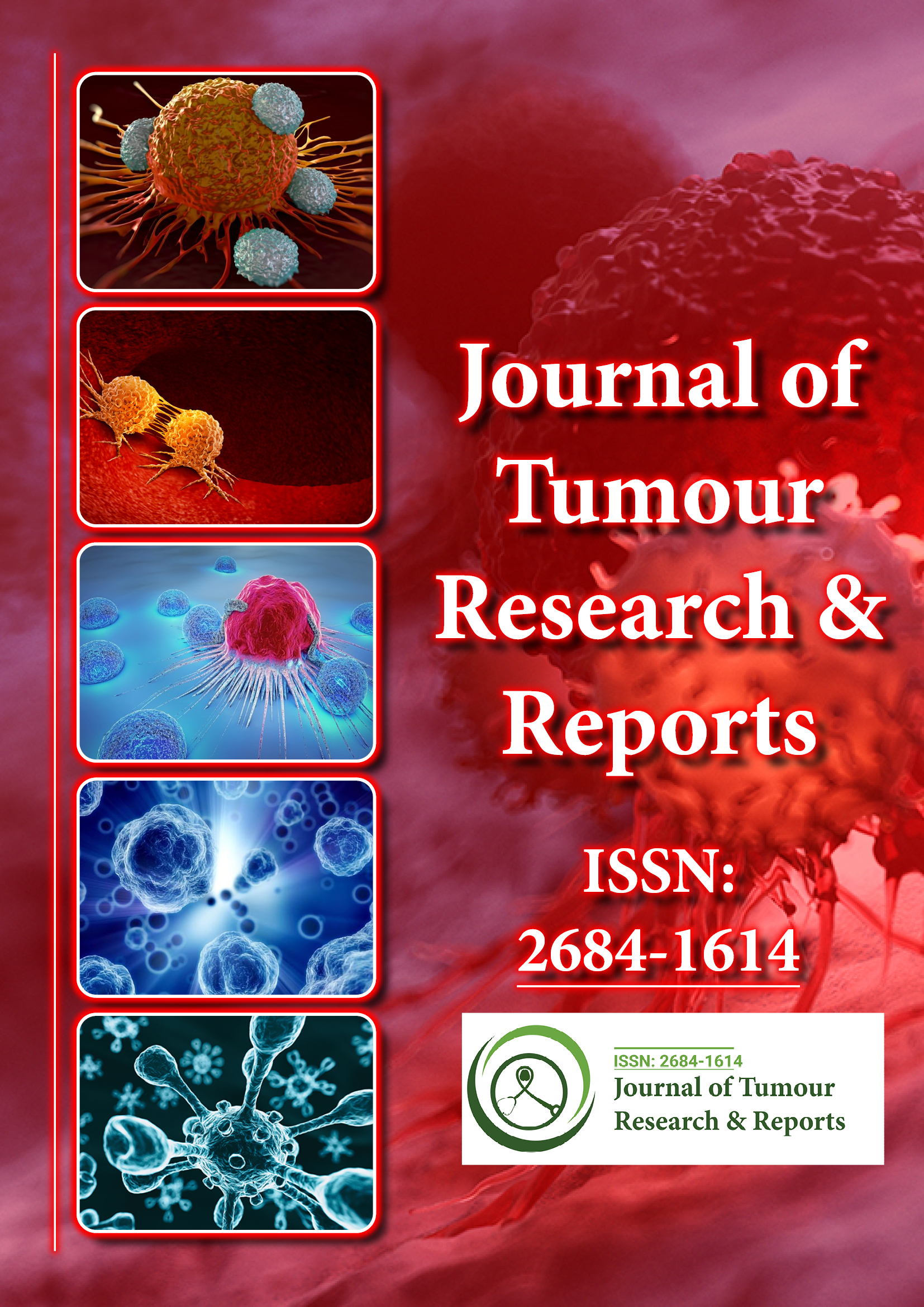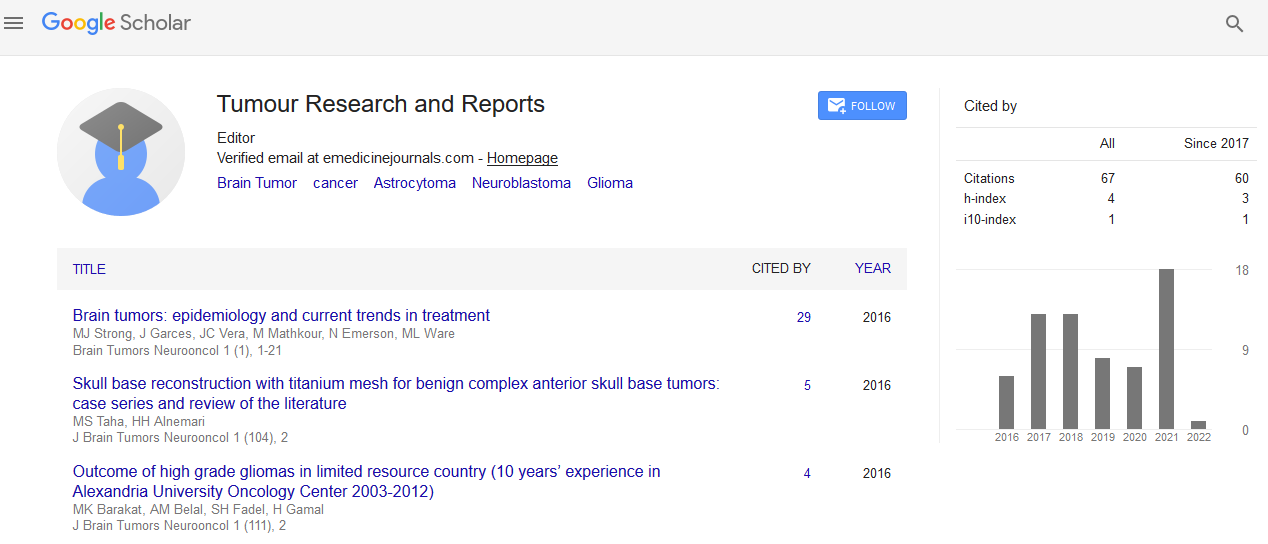Indexed In
- RefSeek
- Hamdard University
- EBSCO A-Z
- Google Scholar
Useful Links
Share This Page
Journal Flyer

Open Access Journals
- Agri and Aquaculture
- Biochemistry
- Bioinformatics & Systems Biology
- Business & Management
- Chemistry
- Clinical Sciences
- Engineering
- Food & Nutrition
- General Science
- Genetics & Molecular Biology
- Immunology & Microbiology
- Medical Sciences
- Neuroscience & Psychology
- Nursing & Health Care
- Pharmaceutical Sciences
Opinion Article - (2023) Volume 8, Issue 2
Shaping the Future of Endometrial Cancer Treatment: Predictive Biomarkers and Novel Therapies
Carrie Thomson*Received: 24-May-2023, Manuscript No. JTRR-23-22039; Editor assigned: 26-May-2023, Pre QC No. JTRR-23-22039 (PQ); Reviewed: 12-Jun-2023, QC No. JTRR-23-22039; Revised: 20-Jun-2023, Manuscript No. JTRR-23-22039 (R); Published: 28-Jun-2023, DOI: 10.35248/2684-1614.23.8.192
Description
Endometrial cancer is the most common gynecological malignancy in developed countries, accounting for approximately 7% of all new cancer cases in women. Despite advances in diagnosis and treatment, the prognosis for advanced or recurrent endometrial cancer remains poor. The identification of reliable biomarkers is significant for early detection, accurate diagnosis, and targeted therapy. Over the years, significant progress has been made in understanding the molecular landscape of endometrial cancer, leading to the discovery of several potential biomarkers with therapeutic implications.
Emerging therapeutic biomarkers and their potential applications
Some of the therapeutic biomarkers are emerging as important predictors for treatment response and potential targets for novel therapies. Such as:
DNA Mismatch Repair (MMR) Deficiency: Deficiencies in the DNA mismatch repair pathway are observed in approximately 20 % - 30 % of endometrial cancers and are often associated with Lynch syndrome. MMR deficiency leads to microsatellite instability (MSI), which is characterized by the accumulation of mutations in repetitive DNA sequences. Pembrolizumab, an immune checkpoint inhibitor targeting programmed cell Death Protein-1 (DP-1), has shown remarkable clinical activity in advanced MMR-deficient endometrial cancer. It has been granted accelerated approval by the FDA for the treatment of recurrent or advanced MSI-high endometrial cancer, highlighting the importance of MMR deficiency as a therapeutic biomarker.
Human Epidermal Growth Factor Receptor 2 (HER2) overexpression: HER2 is a receptor tyrosine kinase that plays a significant role in cell growth and survival. HER2 overexpression is observed in approximately 20% of endometrial cancers and is associated with aggressive disease and poor prognosis. Targeted therapies against HER2, such as trastuzumab and pertuzumab, have shown excellent results in HER2-positive breast cancer. Similarly, HER2-targeted therapies are being evaluated in endometrial cancer, with ongoing clinical trials investigating the efficacy of HER2-directed agents in combination with chemotherapy.
PI3K-AKT-mTOR pathway alterations: The Phosphatidylinositol 3-kinase (PI3K)-AKT-mechanistic target of rapamycin (mTOR) pathway is frequently dysregulated in endometrial cancer. Activation of this pathway promotes cell growth, survival, and angiogenesis, contributing to tumor progression. Biomarkers associated with PI3K-AKT-mTOR pathway alterations, such as PIK3CA mutations and PTEN loss, are potential targets for therapeutic interventions. Multiple PI3K inhibitors, mTOR inhibitors, and combination regimens are being investigated in clinical trials. The identification of predictive biomarkers for patient selection and treatment response monitoring is essential for the successful implementation of targeted therapies in endometrial cancer.
Hormone receptor status: Approximately 80% of endometrial cancers are hormone receptor-positive, with estrogen and progesterone receptors playing important roles in tumor development and progression. Hormone receptor status serves as both a diagnostic and therapeutic biomarker. Endocrine therapies, such as selective estrogen receptor modulators (tamoxifen) and aromatase inhibitors (letrozole), have shown clinical benefits in hormone receptor-positive endometrial cancer. However, the identification of additional biomarkers that can predict response to hormonal therapy and guide treatment decisions is an area of ongoing research.
Immune microenvironment: Emerging evidence suggests that the immune microenvironment plays a critical role in endometrial cancer progression and response to therapy. Tumor- Infiltrating Lymphocytes (TILs), Programmed Death-Ligand 1 (PD-L1) expression, and immune cell signatures have been investigated as potential biomarkers in endometrial cancer. Immune checkpoint inhibitors, such as pembrolizumab, nivolumab, and atezolizumab, have shown excellent results in a subset of patients with advanced or recurrent endometrial cancer.
Advances in molecular profiling technologies and understanding the complex biology of endometrial cancer have paved the way for personalized treatment approaches. Biomarkers such as DNA mismatch repair deficiency, HER2 overexpression, PI3K-AKT-mTOR pathway alterations, hormone receptor status, and immune microenvironment markers are emerging as important predictors of treatment response and potential targets for novel therapies. Further research and clinical trials are needed to validate these biomarkers, refine treatment strategies, and ultimately improve the prognosis of endometrial cancer patients.
Citation: Thomson C (2023) Shaping the Future of Endometrial Cancer Treatment: Predictive Biomarkers and Novel Therapies. J Tum Res Reports. 8:192.
Copyright: © 2023 Thomson C. This is an open access article distributed under the terms of the Creative Commons Attribution License, which permits unrestricted use, distribution, and reproduction in any medium, provided the original author and source are credited.

